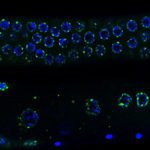Lien vers Pubmed [PMID] – 28854624
Lien DOI – 10.1093/gbe/evx091
Genome Biol Evol 2017 Jun; 9(6): 1450-1470
Interspecific hybridization is a genomic stress condition that leads to the activation of transposable elements (TEs) in both animals and plants. In hybrids between Drosophila buzzatii and Drosophila koepferae, mobilization of at least 28 TEs has been described. However, the molecular mechanisms underlying this TE release remain poorly understood. To give insight on the causes of this TE activation, we performed a TE transcriptomic analysis in ovaries (notorious for playing a major role in TE silencing) of parental species and their F1 and backcrossed (BC) hybrids. We find that 15.2% and 10.6% of the expressed TEs are deregulated in F1 and BC1 ovaries, respectively, with a bias toward overexpression in both cases. Although differences between parental piRNA (Piwi-interacting RNA) populations explain only partially these results, we demonstrate that piRNA pathway proteins have divergent sequences and are differentially expressed between parental species. Thus, a functional divergence of the piRNA pathway between parental species, together with some differences between their piRNA pools, might be at the origin of hybrid instabilities and ultimately cause TE misregulation in ovaries. These analyses were complemented with the study of F1 testes, where TEs tend to be less expressed than in D. buzzatii. This can be explained by an increase in piRNA production, which probably acts as a defence mechanism against TE instability in the male germline. Hence, we describe a differential impact of interspecific hybridization in testes and ovaries, which reveals that TE expression and regulation are sex-biased.


